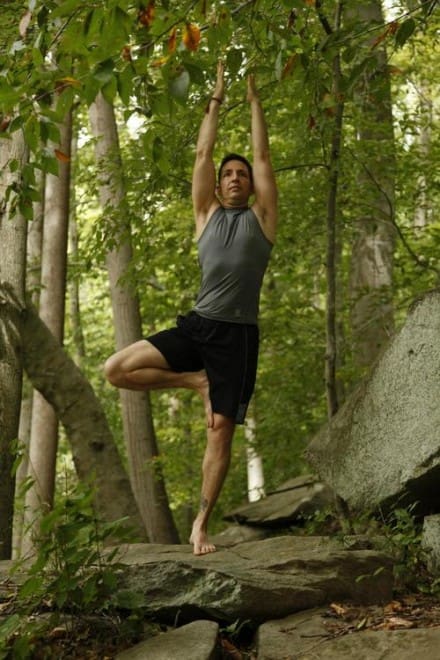Twenty-two veterans commit suicide everyday. For the men and women who have sacrificed so much for our country, one is too many, let alone twenty-two. In an effort to elevate the social conversation around veteran suicide, while also de-stigmatizing PTSD, and reframing the benefits of yoga and meditation, Combat Flip Flops and nearly 20 other veteran and non-veteran owned businesses are joining MalaforVets’ #22adaychallenge.
MalaforVets was established in 2012 by Air Force veteran, Defense Information School instructor, and combat correspondent Chris Eder. Chris began practicing yoga in 1999 and started teaching in 2007. Through yoga, Chris found enormous benefits to his mental, spiritual, and physical capabilities and has made it his mission to share these experiences with other veterans. He teaches several yoga classes each week and offers free classes to vets using the Mindful Yoga Therapy principals.
The goal of the #22adaychallenge is to raise awareness and funds for Save A Warrior and Mindful Yoga Therapy. Participants are encouraged to post an image on Instagram of them doing the daily pose with the #22adaychallenge hashtag. Each day, a random person participating will be selected to win a prize from one of the veteran-owned sponsors. The campaign will run Nov. 1-22, 2015.
“Post military, I had a hard time staying in shape because I wasn’t being paid to work out every day,” said Matthew ‘Griff’ Griffin, former Ranger and CEO/Co-Founder of Combat Flip Flops. “After a motorcycle accident, I was introduced to yoga as a non-impact, balanced form of recovery. It has since been a core part of my workout program because it travels well, provides mental breaks, and a stellar workout. When Chris contacted Combat Flip Flops regarding participation in the #22aDayChallenge, we thought it would be a great way to bring together the local community, introduce veterans to yoga, and create bonds through communal suffering.”
During the challenge, Combat Flip Flops will be sponsoring daily free yoga classes for veterans with veteran-owned, Uphill Running in Issaquah, WA. Non-veterans and family members are welcome to participate with a donation to Save A Warrior Foundation, Mindful Yoga Therapy Foundation, or The Station Foundation.
Additional yoga studios across the country participating include:
Current veteran-owned sponsors include Combat Flip Flops, Nine Line Apparel, Malaforvets, Free Meditation Bench, Buddhist Boot Camp, Webers Wood Creation, 22 Veterans Apparel, Blooming Lotus, Heather’s Treasures, Knot Geek, Cordium Clothing, Yoga Joes, The Sox Box, Fractal 9, and Yoga Warrior Renew. Additional sponsors include Brogamat, Yoga for Men, Bhujang Style, and Kira Grace. Be on the lookout for daily prizes from these brands.
For more information, please visit www.malaforvets.org/22adaychallenge, follow on Instagram at instagram.com/malaforvets, or email Chris Eder at malaforvets@gmail.com.
Tags: Combat FlipFlops



Is that a guy or a girl?
That’s a former Army Ranger. Don’t be a dick.
I recently started to do yoga classes (it’s free at work so technically I’m paid to do so) and it’s a great way of doing a core workout that over time will make you less sore.
There isn’t one solution to vet suicides; anything that reduces the number is good.
Whether it be ever available pyschological support programs, public awareness campaigns to destigmatise, training and employment opportunities, service animals, or simply yoga, great.
It’s silver buckshot as opposed to a silver bullet. It’s easy to shit on yoga, but if it helps – fantastic.
Most of these programs (and there are hundreds) are simply non-profit jobs programs. Thanks to WWP making it big time the new rush is to get into the blank check writing by the government and feel good spending by Americans to “combat” an issue in a million different ways that don’t solve it.
Are a bunch of programs ineffective cheque writing? Yes.
Do some help? Yes.
It’s like the line about advertising – ‘I’m wasting half my advertising budget, I just don’t know which half’.
It is a single issue with a million facets, and we don’t know about all of them or how to treat all of them. Substantive information collection and analysis is an effort that needs to be perpetually undertaken, by both the States and other coalition countries.
When you’re trying to figure out what works, in order to later figure out what works best, money will be wasted in trying to treat before you figure out the solution.
That some money now is ineffective where the goal is to stop veterans from killing themselves, I would see as the lesser loss.
“Substantive information collection and analysis is an effort that needs to be perpetually undertaken, by both the States and other coalition countries.” – Truer words never spoken.
It’s incredibly hard to quantify “success” or the opposite in any arena of the mental health field, and trying to assess the cost-benefit ratio is difficult too. They are both impossible without reliable data and well designed metrics.
I wouldn’t hesitate to recommend yoga or Pilates as part of a rehab program. They, with the possible exception of Pilates, are cheap, non-drug-driven, and widely available, even if that means in forms not programmed to this population. Even that may be a good thing: pushing someone out of their non-comfortable comfort zone into a completely different milieu.
But the guy in the photograph looks like he’s in the process of falling over.